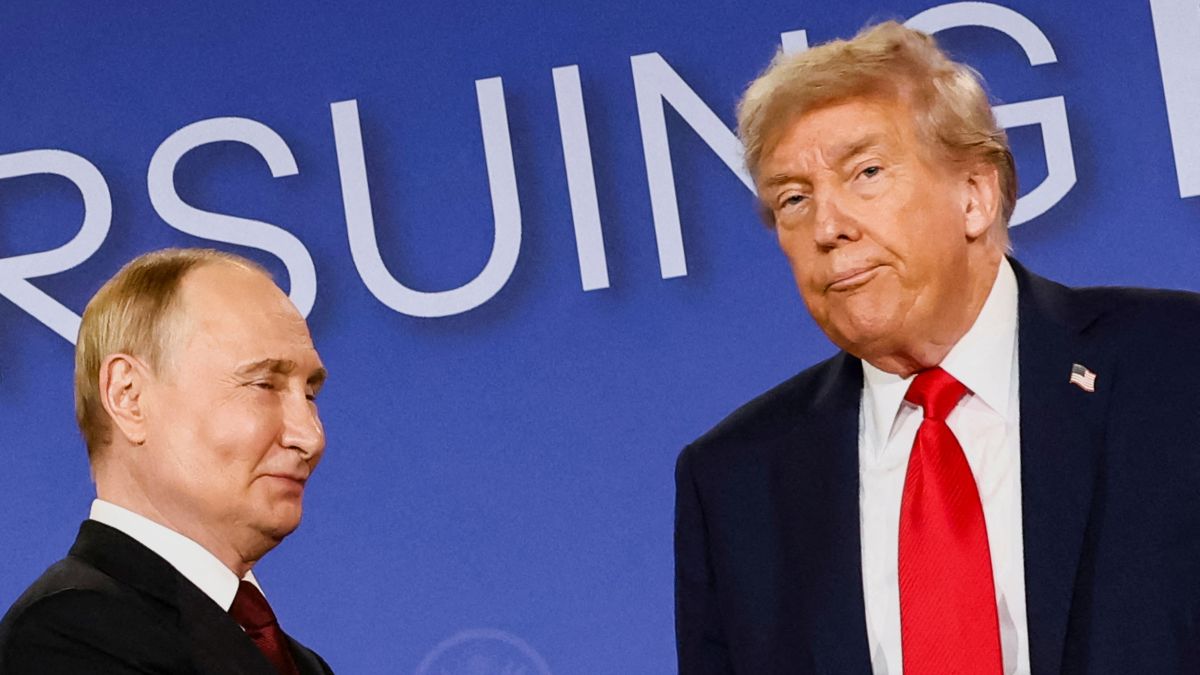The world witnessed the much-awaited summit between United States President Donald Trump and Russian President Vladimir Putin in Alaska on August 15. All eyes, including India’s, were on the meeting as the two leaders discussed the Russian invasion of Ukraine.
Pakistan has ramped up its nuclear threats against India. After the country’s Army Chief Asim Munir, Prime Minister Shehbaz Sharif and former Foreign Minister Bilawal Bhutto warned New Delhi over the suspension of the Indus Waters Treaty following the April 22 Pahalgam terror attack.
Trump’s announcement of additional 25 per cent tariffs on India for purchasing Russian oil stands in stark contrast to his handling of China, which is among the top buyers of crude from Russia. What explains the different treatment?
Here’s all this and much more in our weekly wrap from the world.
1. US President Trump hosted his Russian counterpart at the American military’s Joint Base Elmendorf-Richardson in Anchorage, Alaska. This was Putin’s first visit to the US in a decade, as well as the first-ever visit of a Russian leader to Alaska.
Ahead of the high-stakes summit, Trump had described it as a “feel-out” meeting and threatened Moscow with “serious consequences” if Putin did not agree to a ceasefire. The two leaders met to find common ground to ensure a lasting ceasefire between Russia and Ukraine after a three-year-long war, albeit in the absence of President Volodymyr Zelenskyy. So what came out of it? This story explains .
Impact Shorts
More Shorts2. The world was glued to the high-stakes summit, which held a special interest for India. On Friday, Donald Trump claimed that Russia lost India as one of its oil clients. But after meeting Putin, the US president indicated that he may not impose secondary tariffs on countries like India that procure crude oil from Russia. Here is what this could mean for New Delhi .
3. Pakistan is back at its war rhetoric against India. After Pakistan Army chief Munir’s nuclear threat to India on US soil, PM Sharif and politician Bilawal Bhutto also issued warnings to New Delhi.
Targeting India for pausing the Indus Waters Treaty (IWT), Sharif said that Pakistan will teach a “lesson” to the “enemy” that “you will never forget.” Bilawal Bhutto also threatened India with war if New Delhi continues making changes to the decades-old pact with Islamabad.
Do these threats hold weight, or are they hollow? Read our story to know more .
4. Trump has earlier publicly hit out at India for buying Russian crude oil even as trade talks continue between Washington and New Delhi. He has also imposed 25 per cent tariffs on Indian imports to the US, while threatening an additional 25 per cent levy (which he says he may now reconsider). The discussions to reach a bilateral trade agreement have hit a stalemate over India’s reluctance to open its markets to US agriculture and dairy products.
Moreover, the US president has not attacked China, similarly, for purchasing Russian oil. Instead, this week, he granted a 90-day extension to the existing tariff pause between Washington and Beijing. What’s behind Trump’s starkly different approaches toward two of America’s largest trading partners? We explain here .
5. Israel killed Al Jazeera correspondent Anas al-Sharif, along with four other journalists, while they were resting inside a tent for the press outside Al-Shifa Hospital’s main gate in Gaza.
After the strike, the Israeli military claimed Anas was a “terrorist” and “served as the head of a terrorist cell in Hamas”. Al Jazeera vehemently rejected these claims, calling their reporter “one of Gaza’s bravest journalists.” So, was he a “terrorist” or a journalist? Here’s our story .
6. The young, unemployed people in China are paying to pretend to have jobs. Like any regular worker, they get up in the morning, dress up and leave for their “offices”. However, no one is paying them, and they don’t have to produce any results.
There has been a rise in companies offering a “pretend to work” service in China. Some say they prefer this popular trend to being stuck at home until they get a job. However, others have called it “escapism”. Why are the young, jobless Chinese paying to pretend to be employed? We take a look here .
7. A video has gone viral on social media of a killer whale purportedly attacking and killing a marine trainer named Jessica Radcliffe during a live show. The incident sparked a flood of reactions online, with netizens expressing shock, outrage, and grief.
However, here’s the twist: none of it was real. The video was all an elaborate hoax. Read our story to find out the truth behind the viral clip .
This is all we have for you this week. If you like how we explain the news, you can bookmark this page to stay informed.


)

)
)
)
)
)
)
)
)



